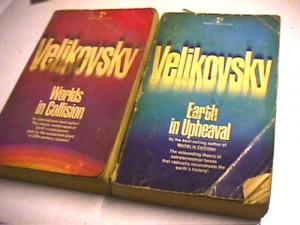Here are some good Sunday reads. I’m one-armed and my newly re-attached bicep tendon is boiling with pain so I’ll keep this short.
In this scintillating review of a new book on Immanuel Velikovsky and pseudoscience, Steven Shapin backgrounds Velikovsky’s famously kooky work:
Velikovsky was convinced that the Old Testament, decoded in th[e proper] way, was an overwhelmingly reliable historical account, that the Jewish records could be used as a standard to calibrate archives of dream-myths – from the Egyptian and Greek to the Chinese and Choctaw – and that, once this radical reinterpretation of world religions was achieved, we would have an accurate account of the physical events that had occurred in historical times and were encrypted in the dream-myths.
Although Worlds in Collision was a pastiche of comparative mythology and planetary astronomy, its major purpose was a radical reconstruction of history. Velikovsky had worked through the annals of myth and ancient history, which substantially supported each other and told the same historical stories; the Jewish story and its chronologies could be used reliably to gauge all the others. The apparent datings of events did differ, but a wholesale recalibration of ancient chronology was both possible and necessary. The ancient historians had got their dates badly wrong, and so too had the astronomers, biologists and geologists, who now needed to understand that spectacular cosmic catastrophes had happened and that historical methods of interpreting ancient texts could be used to establish radically unorthodox scientific stories. Properly understood, Jewish history not only laid bare the inaccuracy of scientific accounts, it securely established the reality of natural events and processes which scientists assumed could not possibly have happened.
Using this bizarre methodology (which is reminiscent of that used by creationists), Velikovsky calmly proceeded to explain everything. Shapin’s epic summary of the whole is one for the ages:
Fifteen hundred years before the birth of Christ, a chunk of stuff blew off the planet Jupiter. That chunk soon became an enormous comet, approaching Earth several times around the period of the exodus of the Jews from Egypt and Joshua’s siege of Jericho. The ensuing havoc included the momentary stopping and restarting of the Earth’s rotation; the introduction into its crust of organic chemicals (including a portion of the world’s petroleum reserves); the parting of the Red Sea, induced by a massive electrical discharge from the comet to Earth; showers of iron dust and edible carbohydrates falling from the comet’s tail, the first turning the waters red and the second nourishing the Israelites in the desert; and plagues of vermin, either infecting Earth from organisms carried in the comet’s tail or caused by the rapid multiplication of earthly toads and bugs induced by the scorching heat of cometary gases. Eventually, the comet settled down to a quieter life as the planet Venus, which, unlike the other planets, is an ingénue at just 3500 years old. Disturbed by the new girl in the neighbourhood, Mars too began behaving badly, closely encountering Earth several times between the eighth and seventh centuries BCE; triggering massive earthquakes, lava flows, tsunamis and atmospheric fire storms; causing the sudden extinction of many species (including the mammoth); shifting Earth’s spin axis and relocating the North Pole from Baffin Island to its present position; and abruptly changing the length of the terrestrial year from 360 to its present 365¼ days. There were also further shenanigans involving Saturn and Mercury.

In “Evangelists of Democracy,” David Rieff likens liberal democratic ideology to religion. It’s a profitable comparison. I don’t apprehend much difference between political-talk and religion-talk, and think politics may in fact be the modern guise of religion. Here’s an excerpt:
This [democracy promotion] hubris should not be surprising. To be sure, the 1990s are not usually regarded as a time of ideological fervor in the United States. Bill Clinton’s presidency is widely viewed as a time of comparative comity (leaving aside the impeachment crisis). But ideological fervor fueled the idea that we were all witnessing the birth of a world in which practically everyone on the planet would live under the same political and economic system. There certainly was no historical basis for such a vision. What emerged was what must be called a missionary zeal for the universalization of democracy curated by the United States. Democracy became as much a faith as a system, and in promoting it governments and NGOs were performing the secular equivalent of the Lord’s work. The force of the comparison between post–Cold War democracy promoters and Christian missionaries of old lies in their confidence that each of their systems—Christianity for the missionary, democratic capitalism for the democracy promoter—is not an answer but the answer.
Thus, Christianity was not some “idea” about which reasonable people could differ. The missionaries saw it as offering the truth, pure and simple. Proponents of democracy building, which itself is best viewed as one subset of the international human-rights movement, do not literally believe themselves to be preaching God’s word. But it was not for nothing that many people both within and outside the human-rights movement have described it as a secular religion. And this heady mixture of Fukuyama, Human Rights Watch and the Soros Foundations stirred in the democracy-promotion movement a moral confidence as robust as that of any member of the White Fathers order in Kenya or Scottish Presbyterian missionaries in China—that is, fallible perhaps on details but infallible on the essential dogma.
Rieff’s critique is not original but serves as a reminder of what people believe is at stake in these matters, and why election season is so overheated. It is best avoided.

